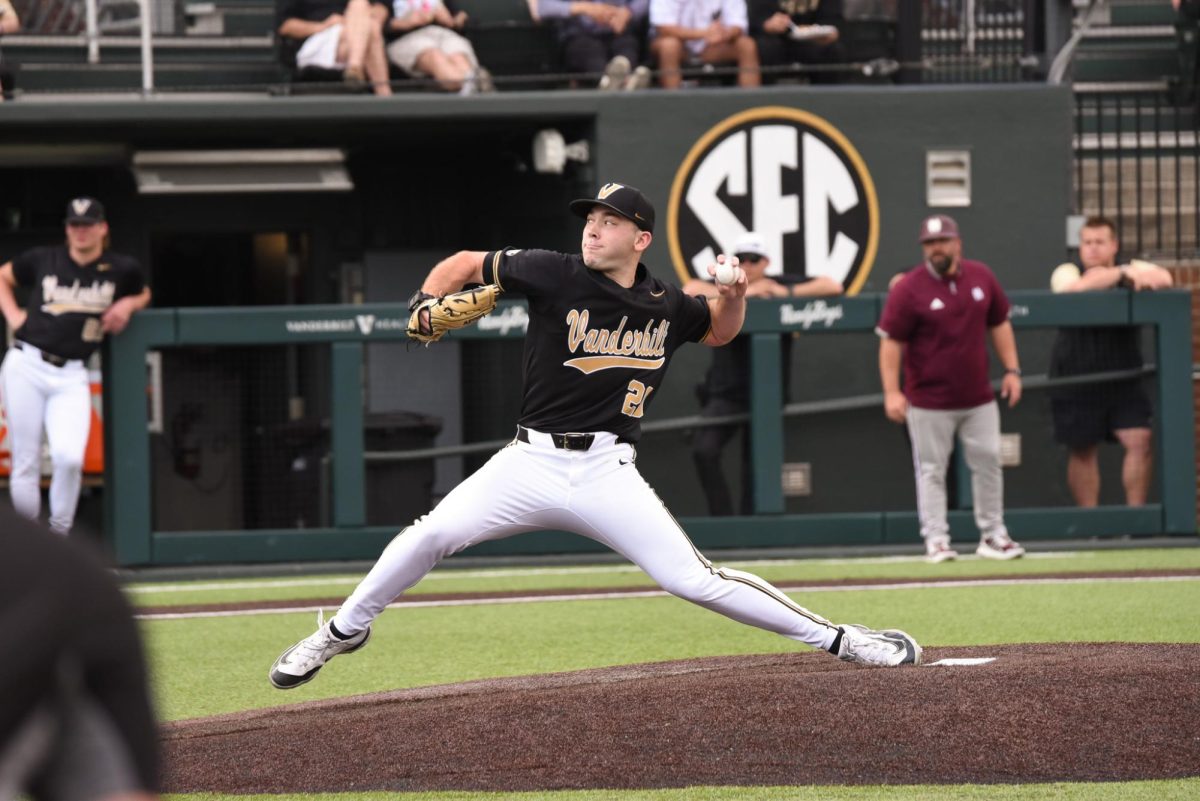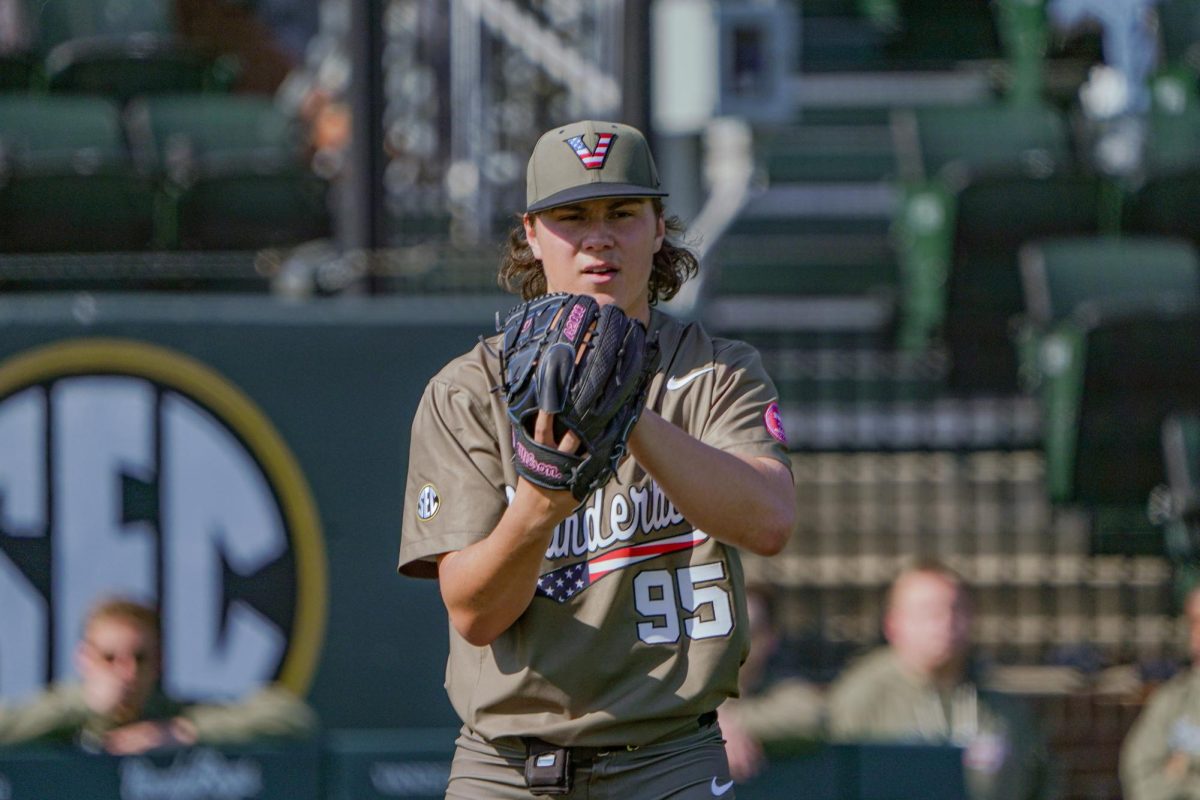After a disappointing sweep at the hands of the Georgia Bulldogs last weekend, Vanderbilt Baseball aimed to return to its winning ways during a four-game homestand. First up was the Battle of the Barrel against Louisville for their last mid-week matchup of the season. The game came down to the wire, but the Commodores secured a 4-2 victory over the Cardinals. Next, Vanderbilt took on the No. 1 Tennessee Volunteers for its penultimate SEC slate. Ultimately, the Volunteers took the series, winning the first two games by a combined margin of five runs, before Vanderbilt took the finale, shutting out Tennessee and avoiding another sweep.
After their losses to Tennessee, the Commodores hold an overall record of 34-18 and a conference record of 12-15, putting them in fifth place in the SEC East standings. The Commodores remain unranked nationally. As of May 8, D1 Baseball had Vanderbilt in the tournament as a three-seed in its projected Round of 64. Following the meeting, Vanderbilt dropped on the RPI and KPI index lists to No. 28 and No. 20, respectively, putting it pretty squarely on the bubble.
The VandyBoys, despite the series loss, can still gather plenty of takeaways from this weekend, especially as they prepare for two paramount meetings—a series against Kentucky and the SEC Tournament—that could determine their postseason hopes.
Three up.
Starting pitchers going the distance
In Vanderbilt’s clash against Georgia, one of its biggest problems was the lack of quality starts it got from its pitchers. Against the Volunteers, the Commodore arms did exactly what they needed to do to put their team in a position to win. Throughout the series, Vanderbilt’s starting pitchers, Bryce Cunningham, Carter Holton and JD Thompson, accounted for 17.2 innings, allowing just five runs and 15 hits. Thompson recorded the best start of his young career, going six innings and striking out a career-best nine batters, allowing just two hits and no runs. Although the other starting pitchers did not set any personal bests, they were still able to contain one of the nation’s most prolific offenses. When Cunningham was replaced, Vanderbilt had a one-run lead, and when Holton was replaced, Vanderbilt trailed by just one run. Ultimately, the pitching woes that Vanderbilt experienced this weekend were not on the starters; it was the bullpen. The starting pitching against the Volunteers proved that Vanderbilt’s staff is highly touted for a reason and showed that Cunningham, Holton and Thompson might just be the go-to three for the rest of the season.
Urgency to win
Under head coach Tim Corbin, Vanderbilt is used to winning. Winning is the standard, and because of that, games are approached with a business-as-usual attitude. However, Sunday showed a Vanderbilt team that knew that its whole season was riding on a victory. This attitude shift was palpable, and it showed that Vanderbilt could match the nation’s best, step-for-step, and, in Sunday’s case, even outperform them. The bats woke up from the start, the adrenaline was pumping and the opposing sides were exchanging words back and forth. Ultimately, Vanderbilt came out on top and while it’s impossible to predict now, the win might be a season turning point, just as Tennessee’s sweep over Vanderbilt was last year.
“[The win against Tennessee] is a tone setter for the rest of the season,” Thompson said. “We’re [going to] carry a lot of momentum into the SEC tournament and we’re going to get to the tournament. I feel very confident about it.”
Sunday displayed arguably the greatest baseball rivalry in the modern era, but more than that, it showed an urgency to win that Vanderbilt has not possessed all season. Furthermore, it showed an urgency that will be absolutely essential if the Commodores want to make a deep postseason run.
Devin Futrell might be the spark the bullpen needs
Junior left-hander Devin Futrell had a phenomenal week, starting on the mound against Louisville and pitching as a reliever against Tennessee. Futrell might be the team’s signal-caller for the rest of the season, with the bullpen struggling to hold leads and generate saves. In Vanderbilt’s win on Sunday, Futrell came in the game for three innings of work as the only reliever following Thompson’s six innings. Across those three innings, Futrell threw just 38 pitches, which tabbed him five strikeouts. He allowed just one hit, and not a single batter reached on balls. Futrell was electric on the mound, and two of his strikeouts came at the top of the ninth inning to put away the win. Despite not getting the traditional start, something he’s more than used to, Futrell offered something that the rest of the bullpen failed to do all weekend: he limited the opposing offense. Futrell is arguably one of the most experienced arms on Vanderbilt’s pitching staff, having pitched 188.2 innings across his three years on West End. This week showed that Futrell is back from the shoulder injury that kept him sidelined for four weeks and ready to serve whatever role his team needs. Going down the stretch, he may be the spark the bullpen requires.
Three down.
Bullpen blues
Vanderbilt’s bullpen underperformed against Tennessee. Across the losses on Friday and Saturday, Vanderbilt used five relievers, who were responsible for 67% of runs (10 of 15) it allowed, all of which were earned. The weight of the game was on the bullpen, and it came up short.
“We’ve got what we got unless Jesus comes into the picture,” Corbin said of the bullpen following Friday’s loss.
In SEC play, the Commodore bullpen has a combined 6.98 ERA and 45 BB. The bullpen is very young, with three of the five relievers used being freshmen. Still, juniors Greysen Carter (four earned runs) and Ryan Ginther (one earned run) proved that it was more than just a freshman issue. Injuries to Sawyer Hawkes and Ethan McElvain certainly don’t help the situation, either. The reality is that Vanderbilt’s relief is going to need to be better, especially in high-leverage situations, if it wants to win games.
Lacking power on offense
This narrative is not a new one, but the one thing Vanderbilt’s offense lacks is a lineup with prolific power hitters. The VandyBoys are ranked in the bottom half of the SEC in slugging percentage (No. 10, .478), on-base percentage (No. 13, .378) and home runs (No. 13, 58). This power gap becomes painfully obvious against teams like Tennessee, which ranks at the top of the categories mentioned. Tennessee got more distance out of its swings, with multiple cuts that seemed defensive turning into home runs. While other SEC opponents possess one to two guys who are hitting 16+ home runs each year, Vanderbilt does not have any players within the top 15 of the SEC in batting average, slugging percentage or runs scored. Braden Holcomb seems the most likely candidate for possessing the power that Vanderbilt needs to compete in the SEC, but he has yet to truly show it. Repeatedly, the Vanderbilt coaching staff has expressed that it is not concerned with the lack of power hitters on the team. Still, many of Vanderbilt’s wins and losses have seemingly come down to just that. At this point in the season, the team’s power-hitting will not experience a complete 180-degree turn. Still, this should be a source of real evaluation and stress for the coaching staff moving forward, whether that means developing the guys Vanderbilt already has or bringing in new ones.
Failure to consistently put runs on the board
Against Tennessee, and especially in SEC play, Vanderbilt has failed to put runs on the board at a consistent rate. This often results in two things: One, the offense scrambles to put together a rally at the last moment, or two, the young bullpen is put in an increasingly high-leverage situation. Don’t get me wrong; the Vanderbilt bullpen has certainly left more to be desired in these situations, and the offense isn’t entirely responsible for those shortcomings. However, the offense could ease that pressure by consistently putting runs on the board. In the first game of the series, Tennessee put up five runs in the eighth, while Vanderbilt failed to put a single run on the board through the final three innings of play. Despite the win on Sunday, the Black and Gold offense struggled in the later parts of the game, as its three runs came in the first two innings. Saturday was the team’s most consistent day at the plate, with runs coming across the plate in four of nine innings, yet the Commodores’ ninth-inning rally came up just short. Generating hits individually is not the issue for Vanderbilt, as it ranks sixth in the SEC with 486. So, if hits are not the issue, then what is? The answer is runs batted in.
First-baseman RJ Austin leads the team with 48 RBIs, yet he ranks outside the top 15 in the SEC in that statistic. Most of Vanderbilt’s top SEC foes have more than one individual within the top 15 of this list. For example, Tennessee has both Dylan Dreiling and Christian Moore tied at No. 8 for RBIs in the SEC at 56-apiece. Furthermore, these players sit at different spots within the Volunteers’ order, at first and sixth, meaning the team generates RBIs throughout its offensive rotation. Having a player like Austin at the top of the lineup who can reliably hit in runners is certainly beneficial, but Vanderbilt lacks another consistent bat to do the same thing at the bottom of the order.
Vanderbilt will travel to Lexington, Ky., from May 16 to 18 to face No. 2 Kentucky in its final SEC matchup of the season.
















